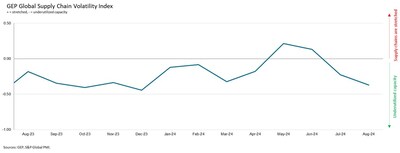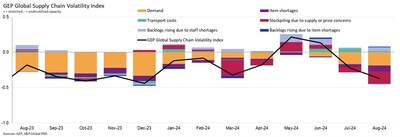Fintech PR
GLOBAL PURCHASING ACTIVITY CONTRACTING AT STRONGEST PACE SINCE DECEMBER 2023 AS MANUFACTURERS WORLDWIDE RETRENCH: GEP GLOBAL SUPPLY CHAIN VOLATILITY INDEX

- North American suppliers report strong rise in excess capacity and the softest demand in eight months, with flagging factory conditions in the U.S.
- Asian suppliers, who experienced growth in the first half of 2024, report spare capacity as Chinese procurement declines
- Europe’s manufacturing recession deepened in August, with Germany and France driving the continent’s downturn
- In contrast to the EU, UK manufacturers close to full utilization
CLARK, N.J., Sept. 11, 2024 /PRNewswire/ — The GEP Global Supply Chain Volatility Index — a leading indicator tracking demand conditions, shortages, transportation costs, inventories and backlogs based on a monthly survey of 27,000 businesses — fell to -0.37 in August. This is its lowest level year-to-date (vs. -0.22 in July), signaling the highest level of spare capacity at global suppliers in 2024. This marked two successive months of underutilized capacity across the world’s supply chains, and the lowest level of input demand in eight months, as global economic conditions deteriorate.

Suppliers in all parts of the globe experienced a slowdown in activity during August. Conditions in North America were the weakest — in fact, vendors used by manufacturers in the region recorded the greatest level of unused capacity since June 2023. Factories in all three of the continent’s economies, but especially the U.S., recorded lower purchasing activity in August, as a result of months of below-average demand, highlighting a diminished near-term outlook.
For the first time since March, our data shows spare capacity across Asian supply chains. Procurement activity in China weakened, which was a key driver of August’s downturn in vendor activity, offsetting strength in India.
Europe’s manufacturing recession continued to dampen supply chains and even worsened further, with the continent’s big-two economies, Germany and France, spearheading manufacturing weakness. In contrast to the continent, U.K. manufacturers are close to full utilization.
“What is most concerning in our August data is that manufacturers are aggressively drawing down their inventory suggesting they’re preparing for a sustained soft patch,” explained Neha Shah, president, GEP. “To head off a material slowdown in the second half of the year, manufacturers need to see interest rates lowered, and for the U.S., China and the EU to avoid raising tariffs and trade barriers.”
AUGUST 2024 KEY FINDINGS
- DEMAND: Global demand for raw materials, commodities and other necessary components like semiconductors shrank in August at an accelerated pace that was the strongest in the year-to-date. The globe’s two economic powerhouses, the U.S. and China, both reported lower procurement activity, as well as other major manufacturing hubs like Germany.
- INVENTORIES: Safety stockpiling was reduced to the greatest extent since March. Reports from global businesses of inventories rising because of supply or price concerns were well below historically typical levels as firms targeted cost savings and lean inventory management amid softening economic conditions.
- MATERIAL SHORTAGES: Reports of item shortages fell for a second successive month and were their lowest since January 2020 as weaker demand had clearly boosted vendor stock levels.
- LABOR SHORTAGES: Reports of manufacturers’ backlogs because of insufficient staffing capacity were muted in August, holding close to their long-term trend level. This indicates that labor supply is generally capable of meeting demand.
- TRANSPORTATION: After having risen in recent months and reaching the highest level since October 2022 in June and July, global transportation costs cooled slightly in August. They were still slightly greater than their long-term average, however.
REGIONAL SUPPLY CHAIN VOLATILITY
- NORTH AMERICA: Index fell sharply to -0.62, from -0.11, signaling the highest level of vendor spare capacity since June 2023. Procurement activity in the U.S. was the weakest across the region during August.
- EUROPE: Index decreased to -0.53, from -0.49 as the continent’s industrial recession intensified. Factory demand in Germany and France was deteriorating rapidly.
- U.K.: Index slipped back into negative territory, falling from 0.11 to -0.14, signaling slack in U.K. supply chains for first time since April.
- ASIA: Index fell to -0.07, from 0.07, indicating underutilized capacity at suppliers to Asia for first time in five months. Although factory activity remains robust in India, procurement managers in China reported cutbacks.
For more information, visit www.gep.com/volatility.
Note: Full historical data dating back to January 2005 is available for subscription. Please contact [email protected].
The next release of the GEP Global Supply Chain Volatility Index will be 8 a.m. ET, October 10, 2024.
About the GEP Global Supply Chain Volatility Index
The GEP Global Supply Chain Volatility Index is produced by S&P Global and GEP. It is derived from S&P Global’s PMI® surveys, sent to companies in over 40 countries, totaling around 27,000 companies. The headline figure is a weighted sum of six sub-indices derived from PMI data, PMI Comments Trackers and PMI Commodity Price & Supply Indicators compiled by S&P Global.
- A value above 0 indicates that supply chain capacity is being stretched and supply chain volatility is increasing. The further above 0, the greater the extent to which capacity is being stretched.
- A value below 0 indicates that supply chain capacity is being underutilized, reducing supply chain volatility. The further below 0, the greater the extent to which capacity is being underutilized.
About GEP
GEP® delivers AI-powered procurement and supply chain solutions that help global enterprises become more agile and resilient, operate more efficiently and effectively, gain competitive advantage, boost profitability and increase shareholder value. Fresh thinking, innovative products, unrivaled domain expertise, smart, passionate people — this is how GEP SOFTWARE™, GEP STRATEGY™ and GEP MANAGED SERVICES™ together deliver procurement and supply chain solutions of unprecedented scale, power and effectiveness. Our customers are the world’s best companies, including more than 1,000 Fortune 500 and Global 2000 industry leaders who rely on GEP to meet ambitious strategic, financial and operational goals. A leader in multiple Gartner Magic Quadrants, GEP’s cloud-native software and digital business platforms consistently win awards and recognition from industry analysts, research firms and media outlets, including Gartner, Forrester, IDC, ISG, and Spend Matters. GEP is also regularly ranked a top procurement and supply chain consulting and strategy firm, and a leading managed services provider by ALM, Everest Group, NelsonHall, IDC, ISG and HFS, among others. Headquartered in Clark, New Jersey, GEP has offices and operations centers across Europe, Asia, Africa and the Americas. To learn more, visit www.gep.com.
About S&P Global
S&P Global (NYSE: SPGI) S&P Global provides essential intelligence. We enable governments, businesses and individuals with the right data, expertise and connected technology so that they can make decisions with conviction. From helping our customers assess new investments to guiding them through ESG and energy transition across supply chains, we unlock new opportunities, solve challenges and accelerate progress for the world. We are widely sought after by many of the world’s leading organizations to provide credit ratings, benchmarks, analytics and workflow solutions in the global capital, commodity and automotive markets. With every one of our offerings, we help the world’s leading organizations plan for tomorrow, today.
|
Media Contacts |
||
|
Derek Creevey |
Joe Hayes |
S&P Global Market Intelligence |
|
Director, Public Relations |
Principal Economist |
Email: [email protected] |
|
GEP |
S&P Global Market Intelligence |
|
|
Phone: +1 646-276-4579 |
Phone: +44-1344-328-099 |
|
|
Email: [email protected] |
Email: [email protected] |


Photo – https://mma.prnewswire.com/media/2501835/GEP_Graph__Infographic.jpg
Photo – https://mma.prnewswire.com/media/2501837/GEP_Infographic.jpg
Logo – https://mma.prnewswire.com/media/518346/GEP_Logo.jpg

Fintech PR
President Emmerson Mnangagwa met this week with Zambia’s former Vice President and Special Envoy Enoch Kavindele to discuss SADC’s candidate for the AfDB
President Mnangagwa, who is SADC Chairperson, reaffirmed his own country’s and SADC’s enthusiastic support for Zambian candidate Sam Maimbo
LUSAKA, Zambia, Dec. 20, 2024 /PRNewswire/ — Special Envoy Kavindele released the following statement following the meeting:
“I am elated to witness the growing success and momentum of Sam Maimbo’s candidacy to become the next President of the African Development Bank. I am filled with gratitude to our friends across both SADC and COMESA for their continued support and good wishes.
Sam has garnered such wide consensus due to his being uniquely qualified to deliver the transformative change and empowerment our continent needs. Sam’s 30 years in development work is defined by driving outcomes, improving processes, and investing in people. The AfDB needs a hands-on leader who is laser focused on delivering results and who is unafraid of making tough decisions in order to best serve our continent. Sam is that leader. Sam has the track record and experience to drastically enhance the pace, scale, and impact of the Bank’s work in service of the people and governments of Africa.
Our region has a proud history of supporting fellow Southern Africans. For example, we all recall Lusaka’s role in hosting the African National Congress’ headquarters during the dark days of Apartheid oppression.
It therefore gives me no pleasure to observe my South African brothers, who have themselves leant on Zambia’s steadfast friendship over many decades, fail to rally behind both SADC and COMESA’s chosen candidate for the AfDB. Africa’s urgent economic development challenges demand transformational leadership at the AfDB, it is all of our responsibility to put forward the best candidate for the job. This is not the time or place for a government to act with narrow self-interest, we all must act in the continent’s and AfDB’s best interest.
I thank Sam Maimbo for his lifelong service to our entire continent, and I am eager to witness his enormous impact as President of the AfDB.”

Fintech PR
Stay Cyber Safe This Holiday Season: Heimdal’s Checklist for Business Security
LONDON, Dec. 20, 2024 /PRNewswire/ — Heimdal Security shares a practical holiday cybersecurity checklist, offering expert insights to help businesses safeguard against cyber threats this festive season.
With reduced staffing, remote work setups, and a surge in online shopping creating heightened vulnerabilities, this guide offers actionable tips to enhance business security.
Going beyond basic advice, the checklist also highlights the most common holiday scams and features videos showcasing real-life examples of Christmas-themed cyber scams and effective prevention strategies.
Key Tips to Protect Businesses This Holiday Season:
- Strengthen endpoints: Ensure devices are updated with antivirus and endpoint protection software; consider Endpoint Detection and Response (EDR) and application whitelisting.
- Prepare for phishing spikes: Train staff to identify suspicious emails, enforce robust email filters, and establish protocols for reporting unusual activity.
- Secure remote access: Mandate VPN usage, monitor unusual logins, and deactivate inactive accounts temporarily.
- Segment and shield networks: Isolate sensitive areas, deploy DNS security and advanced firewalls, and maintain full visibility over network traffic.
- Apply timely patches: Regularly update all systems and test patches in a controlled environment to minimize disruptions.
- Mitigate supply chain risks: Assess vendors thoroughly and limit their access to essential systems.
- Have a response plan ready: Tailor incident protocols for the holidays, create an on-call rotation for the IT team, and enable rapid action against suspicious activity.
“ Cybercriminals thrive on holiday distractions, but with proactive measures like phishing training, secure endpoints, and network segmentation, businesses can stay ahead of potential threats,” said Alex Panait, System Administrator at Heimdal Security.
Common Holiday Scams That Businesses Should Watch For:
Cybercriminals often tailor their tactics to exploit the festive season. The most common scams include:
- Spear phishing: Emails disguised as holiday bonuses or event invitations that steal credentials or spread malware.
- Malicious holiday E-Cards: Festive greetings that contain links deploying ransomware or spyware.
- Fake E-Commerce sites: Fraudulent websites offering discounts to steal payment information.
- Insider threats: Distracted or disgruntled employees mishandling or exploiting sensitive data.
- Corporate travel scams: Fake booking platforms targeting business travelers.
- Business email compromise (BEC): Fraudulent requests for urgent wire transfers during year-end financial rushes.
For more, read the full article here or watch the video on YouTube to see how these threats unfold and learn actionable prevention strategies.
About Heimdal:
Established in Copenhagen in 2014, Heimdal® empowers CISOs, security teams, and IT administrators to improve their security operations, reduce alert fatigue, and implement proactive measures through a unified command and control platform.
Heimdal’s award-winning cybersecurity solutions span the entire IT estate, addressing challenges from endpoint to network levels, including vulnerability management, privileged access, Zero Trust implementation, and ransomware prevention.
For further press information:
Madalina Popovici
Media Relations Manager
[email protected]
View original content:https://www.prnewswire.co.uk/news-releases/stay-cyber-safe-this-holiday-season-heimdals-checklist-for-business-security-302337465.html

Fintech PR
According to Tickmill survey, 3 in 10 Britons in economic difficulty: Purchasing power down 41% since 2004
The people who have the most problems are women (30%) and are between 35 and 49 years old (39%)
ROME, Dec. 20, 2024 /PRNewswire/ — The purchasing power in the UK has dropped by 41% over the last 20 years. Today, £100,000 left in a bank account since 2004 without being invested would now be worth £59,021.
This figure is one of the findings from a study conducted by Tickmill, an international online trading broker that compared the economic situation in the UK and the European Union through the infographic “Purchasing Power and Cost of Living: UK vs EU”.
The analysis reveals a slight decline of 0.4% in the UK’s purchasing power, which currently stands at £41,573. In contrast, the European Union has seen a modest rise of 0.1%, reaching £40,874.
Why is purchasing power declining in the UK? One key factor is the cost of living. If the UK were still part of the European Union, it would rank as the fifth most expensive country, behind Ireland, Luxembourg, Denmark, and the Netherlands.
Unsurprisingly, 3 in 10 Britons are struggling with the cost of living. Women (3 in 10, compared to 25% of men), those aged between 35 and 49 (4 in 10), households earning less than £15,000 (6 in 10), and single parents (1 in 2) are among the most affected groups.
Among UK nations, Northern Ireland is the hardest hit, with 34% of its population facing financial difficulties, followed by Wales (31%), England (28%), and Scotland (22%). In England, the North East has the highest percentage of people struggling, with 4 in 10 residents affected. Even in London, the high costs impact 1 in 4 adults.
In response to these challenges, Britons are making significant adjustments:
- 53% have cut back or delayed spending on smaller items like eating out, entertainment, subscriptions, clothing, toys, books, etc.;
- 52% have reduced household energy consumption;
- 48% have decreased their grocery spending;
- 41% have scaled back or postponed major expenditures, such as holidays, cars, and weddings;
- 26% are working longer hours, taking on overtime, or pursuing additional jobs to earn extra income.
The British also made changes on the financial side. One in four adults has been forced to dip into their savings or investments to cover daily expenses. Moreover, 44% have stopped saving or investing entirely or have reduced their savings and investments—a 4% increase compared to 2023.
The lack of investment is another critical factor contributing to the decline in purchasing power. It is estimated that 13 million UK residents hold £430 billion in cash deposits but do not invest. The reasons? Seventy-four percent say they cannot compare investment products effectively, and 43% are afraid of losing their money.
A lack of knowledge and fear are preventing many savers from taking advantage of an important opportunity: preserving or increasing their purchasing power in the long term.
Photo: https://mma.prnewswire.com/media/2586123/Tickmill.jpg
Logo: https://mma.prnewswire.com/media/2586129/Tickmill_Logo.jpg
![]() View original content to download multimedia:https://www.prnewswire.co.uk/news-releases/according-to-tickmill-survey-3-in-10-britons-in-economic-difficulty-purchasing-power-down-41-since-2004-302337354.html
View original content to download multimedia:https://www.prnewswire.co.uk/news-releases/according-to-tickmill-survey-3-in-10-britons-in-economic-difficulty-purchasing-power-down-41-since-2004-302337354.html

-

 Fintech5 days ago
Fintech5 days agoFintech Pulse: Your Daily Industry Brief (Synapse, Shenzhen Institute, Visa, AutomatIQ, MeridianLink)
-

 Fintech5 days ago
Fintech5 days agoFintech Pulse: Your Daily Industry Brief (Revolut, Bestow, Advyzon, Tyme Group, Nubank)
-

 Fintech2 days ago
Fintech2 days agoFintech Pulse: Your Daily Industry Brief (Chime, ZBD, MiCA)
-

 Fintech5 days ago
Fintech5 days agoAsian Financial Forum returns as region’s first major international financial assembly in 2025
-

 Fintech6 days ago
Fintech6 days agoNASDAQ-Listed LYTUS Appoints Visionary Leader Sai Guna Ranjan Puranam as COO (Lytus Healthcare) and Group CTO (Lytus Technologies) to Revolutionize Healthcare and Technology
-

 Fintech PR2 days ago
Fintech PR2 days agoAccording to Tickmill survey, 3 in 10 Britons in economic difficulty: Purchasing power down 41% since 2004
-

 Fintech6 days ago
Fintech6 days agoDhaka Court Dismisses Allegations Against Nagad Founder Tanvir A Mishuk
-

 Fintech PR4 days ago
Fintech PR4 days agoGan & Lee Pharmaceuticals Announces U.S. FDA Clearance of the IND application for the innovative Bi-weekly GLP-1RA GZR18 Injection, Bofanglutide, with chronic weight management Indication (A Phase 2 head-to-head with Tirzepatide clinical trial)





